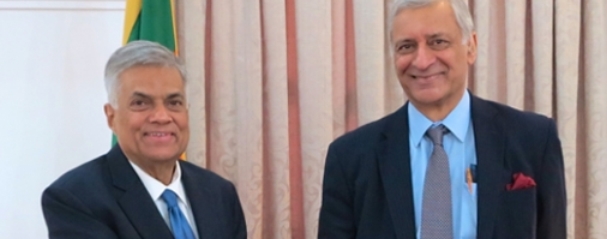[ Kamalesh Sharma with PM Ranil Wickremesinghe ]
The Government is considering the full implementation of the recommendations of the Lessons Learned and Reconciliation Commission (LLRC), Commonwealth Secretary General Kamalesh Sharma said.
Former President Mahinda Rajapaksa refused to fully implement the recommendations of the LLRC and that resulted in some countries accusing Sri Lanka of failing to address accountability issues on the war.
In a statement issued today at the conclusion of a brief visit to Sri Lanka, Sharma said he had discussed options for practical Commonwealth support for vital domestic processes in Sri Lanka, and welcome the intent to establish a credible domestic investigation mechanism that respects international humanitarian law.
Sharma said that the purpose of his visit to Sri Lanka was primarily to reiterate and renew the Commonwealth’s commitment to work in partnership with Sri Lanka to advance its own national plans.
“We have successfully identified areas where the Commonwealth will provide practical assistance as the country turns a new and transformative page in its history,” he added.
Sharma noted the positive steps taken by the Government since 9 January and the further measures contemplated. These include a commitment to fundamental governance reforms and strengthening the independence of national institutions; the appointment of civilian governors in the Northern Province and Eastern Province amongst other changes in the provincial administrations; and, the appointment of the new Chief Justice.
During his visit Sharma met President Maithripala Sirisena, Prime Minister Ranil Wickremesinghe, Minister of Foreign Affairs Mangala Samaraweera, Minister of Public Administration Karu Jayasuriya, and Minister of Finance Ravi Karunanayake. He also met Provincial Governors and Chief Ministers.
“My meetings offered the opportunity to explore ways in which we could support priority areas in the Government’s ambitious 100-Day Work Programme. These will build on our ongoing assistance to advance the fundamental values and principles of the Commonwealth as set out in the Commonwealth Charter,” he said.
Sharma said that the Commonwealth will focus its technical assistance in a number of areas, which include:
•Expertise and information on best pan-Commonwealth practice to build a fully independent national human rights commission, electoral commission, judicial services commission, media commission, and an anti-corruption institution;
•Expertise to strengthen Parliament and its oversight committee structure in consultation with the Hon Speaker; and,
•Expertise and advice to strengthen the independence of the judiciary in line with the Commonwealth’s Latimer House Principles on the separation of powers, on which the Commonwealth’s best practice compendium has been submitted.
The Commonwealth also remains ready to extend support by:
•Providing technical assistance to help implement the Right to Information Act;
•Extending the Commonwealth’s programme to strengthen the quality and professionalism of the Public Service;
•Supporting transparency and good governance in public finance management;
•Offering experience from other Commonwealth countries on electoral reform that may usefully inform Sri Lanka’s own consideration in this area;
•Strengthening of the Attorney-General’s Office; and,
•Promoting youth entrepreneurship in the Northern and Eastern Provinces, including through the Commonwealth Alliance of Asian Young Entrepreneurs (CAAYE).
The Commonwealth is also developing:
•A comparative compendium of practice across the Commonwealth concerning the appointment procedures for human rights commissioners and which enhances the independence of national human rights institutions; and,
•A compendium of practice from across the Commonwealth concerning the establishment and independence of Election Management Bodies. These will be shared with Sri Lanka.
Many of these areas will involve the Commonwealth Secretariat working in partnership with other Commonwealth bodies with specialist expertise.
Sharma said his visit was also an opportunity to brief the President on his role as Commonwealth Chair-in-Office. They discussed progress in implementing CHOGM mandates set by leaders when the Commonwealth met in Sri Lanka in November 2013.
“In my meeting with Foreign Minister Mangala Samaraweera, we discussed the mandate of the Commonwealth Ministerial Action Group (CMAG) to work with member countries in a proactive and positive way in advancing the Commonwealth’s political values. We look forward to the Minister’s participation at CMAG’s next meeting in March in London. The Sri Lankan Foreign Minister will also be chairing the annual Commonwealth Foreign Affairs Ministers Meeting in New York in September,” he added.
Sharma said Sri Lanka’s people have strongly validated their country’s democratic credentials and this is a matter of pride as much for the Commonwealth as it is for Sri Lanka.
